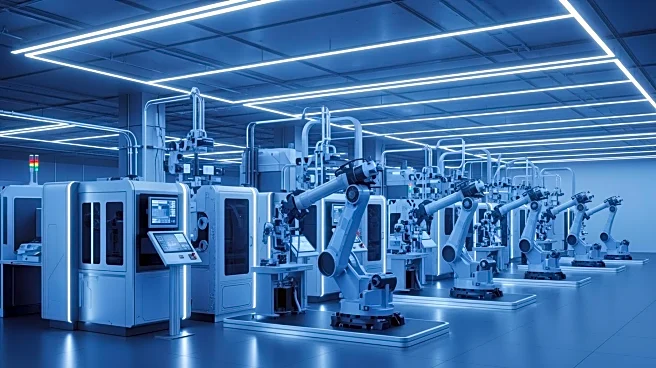What's Happening?
Merck has announced the groundbreaking of a new pharmaceutical manufacturing facility in Elkton, Virginia, as part of its $70 billion U.S. investment strategy. The 400,000-square-foot site is expected
to create 500 full-time positions and approximately 8,000 construction jobs during its development. This initiative is one of the largest pharmaceutical investments during President Trump's second term, aligning with the administration's focus on domestic drug production. The facility will expand U.S. production of vaccines and critical medicines, serving as a hub for next-generation therapeutics.
Why It's Important?
Merck's investment in Virginia is a significant step towards bolstering domestic pharmaceutical manufacturing, reducing reliance on foreign drug production. This move supports the 'Made in America' initiative, potentially leading to increased job creation and economic growth in the region. The expansion of vaccine and medicine production is crucial for public health, especially in light of recent global health challenges. By investing in U.S. manufacturing, Merck aims to enhance its innovation capabilities and provide new treatment options for patients.
What's Next?
Merck plans to complete most of the construction by 2028, with manufacturing beginning in 2029 and supply operations launching in 2030. The company will continue to collaborate with the Trump administration on policies that promote innovation and protect the U.S. pharmaceutical industry. Virginia's Governor Glenn Youngkin has praised the project, highlighting its potential to solidify the state's role as a leader in advanced manufacturing and healthcare innovation. As Merck's expansion progresses, it may influence other pharmaceutical companies to invest in U.S. manufacturing.
Beyond the Headlines
The establishment of Merck's manufacturing plant in Virginia may have long-term implications for the pharmaceutical industry, including shifts in supply chain dynamics and increased focus on domestic production. This development could lead to more stringent policies on drug imports and exports, affecting global trade relations. Additionally, the emphasis on next-generation therapeutics may drive advancements in medical research and innovation, potentially leading to breakthroughs in treatment options for various health conditions.









